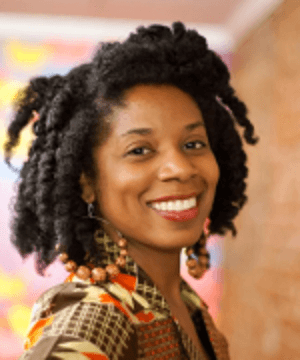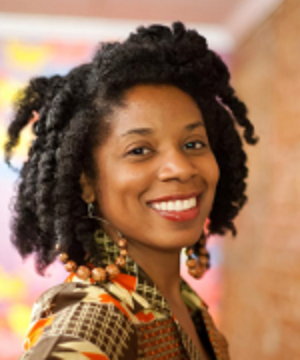An Interview with Idrissa Simmonds-Nastili, Pahara Institute
This interview is the thirteenth in our series, Black & Bold: Perspectives on Leadership. For more about this series, click here.
Idrissa Simmonds-Nastili, Director, NextGen Fellowship, Pahara Institute
Extremist for Love. Community Builder. Learner.
If there was a headline for your leadership journey throughout your career, what would it be? 
It would be “faith in action.” There are very few things I have done in my life and career where I had clarity at the outset that I was making the right choice. But I have leapt anyway. And each leap gives me greater clarity that my desired outcomes won’t manifest unless I take bold action in that direction. Regardless of doubting myself or questioning the right next move, I’ve leaned into prayer, meditation, and reflection to see my way through towards action.
What are some of your career highlights?
Despite considering myself to be somewhat of a homebody, I have picked up and moved whenever I felt I had value to add.
Moving to Ghana early in my career to work in health education was one of the first times I made a bold move, regardless of fear and uncertainty. My family background is Jamaican and Haitian, both sides descendent of West Africa. My parents have always been proud of our roots and culture and instilled this in my siblings and myself. So, I was excited to live in Ghana and learn firsthand about the links to the Caribbean — as well as contribute to a professional setting in one of my first roles coming out of undergrad.
I found a fellowship and applied, and I got it.
This was one of the best personal and professional decisions I have made.
I moved to New York to attend graduate school and began my career in U.S. education with Uncommon Schools, which underscored for me the unique contributions I could offer a high-performing organization. This role also exposed me firsthand to the challenges students face every day in navigating both school systems and their home lives. I always turn back to the students when I think of the why behind my work. This keeps me focused, driven, and honest.
I moved from Brooklyn to Oakland three years ago. I’m originally from Brooklyn, despite growing up in Canada, and I absolutely loved living in Brooklyn. I have an incredible community there that I am deeply connected to. And, I loved walking up the block from my apartment to get my roti and doubles! I made the leap to a new organization and a new role because the more I learnt about the goals and purpose of the work I now lead at Pahara, the clearer I became that this was the right next step for me to take. This role has continued to highlight for me that building deep community across lines of difference is a key driver to sustainable change and positive outcomes for kids. We, the adults, have to learn to lead together on their behalf.
What are your favorite types of challenges?
Emerging on the other side of self-doubt, working through complexity, and finding another way in leaves me stronger and more fortified. When I face such challenges again, I know that I have seen it, know I can do it, and can work through and around those challenges.
In Ghana, one challenge was learning to be a professional in a community and culture very different from the community, culture, and context I grew up in. My understanding of what I needed to do to be a professional was going in, identifying the problem, working in partnership with people on the ground, and bringing value. I very soon realized that Ghana is a place centered on community and relationships. Had I trusted my voice I would have entered the professional setting and led with that. Ghana soon humbled me and centered me in understanding that I could lead from a place of personal values. In my role, I needed to sit with people and eat with them…I needed to be in deep community before shifting to the work.
What is one book that was meaningful or influential in your development as a leader?
I have to bypass this question. (Laughter.) I hate “one book” questions. I take pieces from many books that have impacted me in my leadership. In terms of a technical book about leadership, Stephen Covey’s The 7 Habits of Highly Effective People is a valuable read to me.
Anything by Toni Morrison and Jamaica Kincaid leaves me fortified and empowered as a Black woman and reminds me of who I come from. I’m currently reading Emergent Strategy by adrienne maree brown, which is a powerful resource for anyone looking for community-centered and innovative approaches to their work.
James Baldwin’s The Price of the Ticket is an incredible collection of his essays. He is not afraid to address the hard topics and reading him reminds me to go forth with boldness. I lose nothing by speaking the truth. In my head, James is my uncle.
Work in the social sector can be very personal and linked to one’s values. Can you think of a time when your values were in tension during your career and how you reconciled that tension or not?
I feel really blessed to work at a place with agency, where I am heard and a partner in decision making. There have been instances of having to reclaim my time in the past. This field experiences a tension between diversity and equity. I’ve worked for organizations big on diversity in terms of looking at the number of people of color on staff, but after digging into the data it was evident that entry level staff were people of color while leadership was predominantly white. The work I want to do is grounded in equity for true transformation, not diversity for diversity’s sake. If I find myself straying from this value, it’s time to reevaluate what I am doing.
Can you share an experience in the workplace where you have had to reclaim your time? What was the context? How did you navigate it? What was the outcome?
This goes back to doing work related to diversity. I was at an organization leading a recruitment initiative and a manager questioned the need for my role. She was questioning the need for what I specifically brought to the work: my lens on diversity and leadership development. She was gaslighting me and I didn’t have the language to put her in her place. I was younger in my career. My response was to continue doing my work and building this program. The strong results of that work ended up being the outcome. Transformation was much slower, but it did happen. My manager at that time landed in a different place in her thinking as a result of seeing my results. Many people don’t understand the necessity of this work. Now I am much more direct. I lean on data, showing the impact of work like NextGen, and emphasize that.
What’s your approach to self-care? Are there any rituals you use to survive and thrive?
I am big on baths. If I can find time to just let my body relax, that is big for me.
I have a journal that has prompts for me to think about how I’m living my life. Part of my self-care practice is journaling, unearthing what’s going on with me.
Prayer — being in communication with my higher power and the universe. This serves as my guide, me versus allowing fear or anxiety to be the guiding force.
There have been painful transitions in my personal life: I lost both of my parents in the first three months of the year. I also became a mother in the last year. So, there is a lot of joy and heartache in my family’s journey, which makes it feel at times that you are at the whim of the universe. The more I find myself grounded in my own why, the more I can remain focused and intentional even when the world doesn’t make sense.
Girl time with women who love me and whom I love is necessary. While individual time is key, I know I am not in a good place if I am really isolating myself from my loved ones. Remaining connected and leaning in, even when it’s hard to, is part of my self-care.
What advice would you offer other Black women trying to develop or amplify their voice and become self-advocates?
- Identify a mentor. If you feel you don’t have one, reach out to a Black woman you have a connection with and take her out to lunch. Get to know her. Ask about her journey. If there is someone you admire, lean into that further. Believe that you two intersected for a reason and reach out. Make that connection. The vast majority of women will be honored to have that connection, especially if it’s coming from a genuine interest.
- Read. The more I read the more I know that I am not alone in my struggles, based on the experiences of others. There is a lot for me to learn from books and articles.
- Find a community to help you move through gaslighting and microaggressions. Even if they are not with you physically, you can lean on their strength. And beyond helping you through the hard stuff: laughter is key! Sisterhood is beautiful. Love will lead us through.
- Don’t allow fear to be in the driver’s seat. Fear is an emotion like any other, so I’m not a believer in trying to push it aside or pretending like it is not there at all. But we often let the fear lead, versus the curiosity, excitement, and sense of possibility that we may also feel. Consider putting a more positive emotion behind the wheel of your life.
- On a technical level, don’t forget that if you are excellent in your career and are adding value to your organization, they need you more than you need them. You may never hear those words but know and trust your value. Whatever is moving through the back of your mind about what you want to achieve, trust that voice and know you can do it. For Black women, we can spend too much time at a place where our full potential is not being recognized. We have a tendency to remain loyal. It’s more important to remain loyal to your highest self and your value as you navigate your career.
- Above all, pay attention to your own voice. “She will not lead you astray,” as a friend recently pointed out to me online. Be unapologetically yourself. Social media can cause you to forget the power of your own voice. It’s great to find inspiration via others’ online platforms, but not if you are finding yourself overwhelmed and convinced that everyone else has it figured out. Step back and get quiet with your own unique power.



OMG Beautiful! You continue to amaze, inspire, challenge and give generously to your readers and your many communities. Congratulations and thank you so very much for sharing your gifts including the creation of the Black and Bold series.